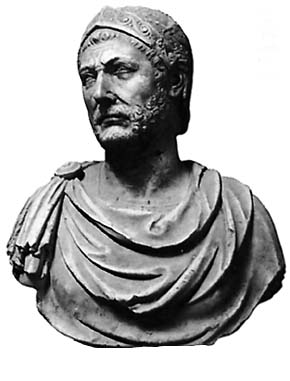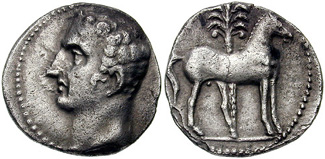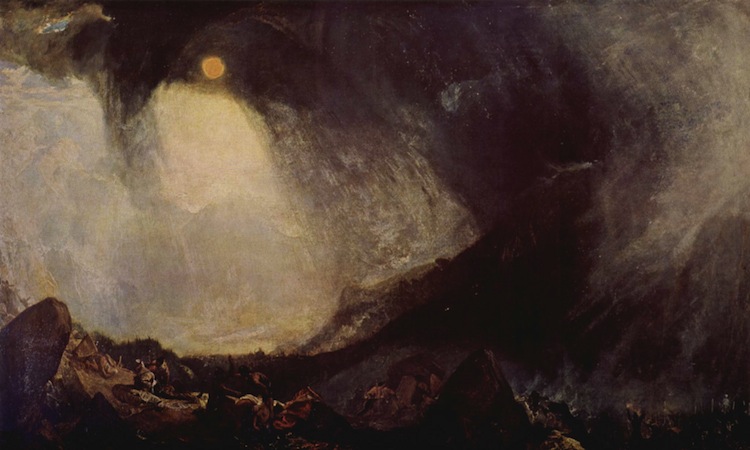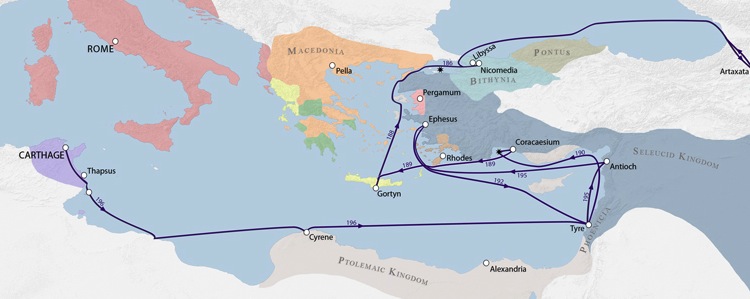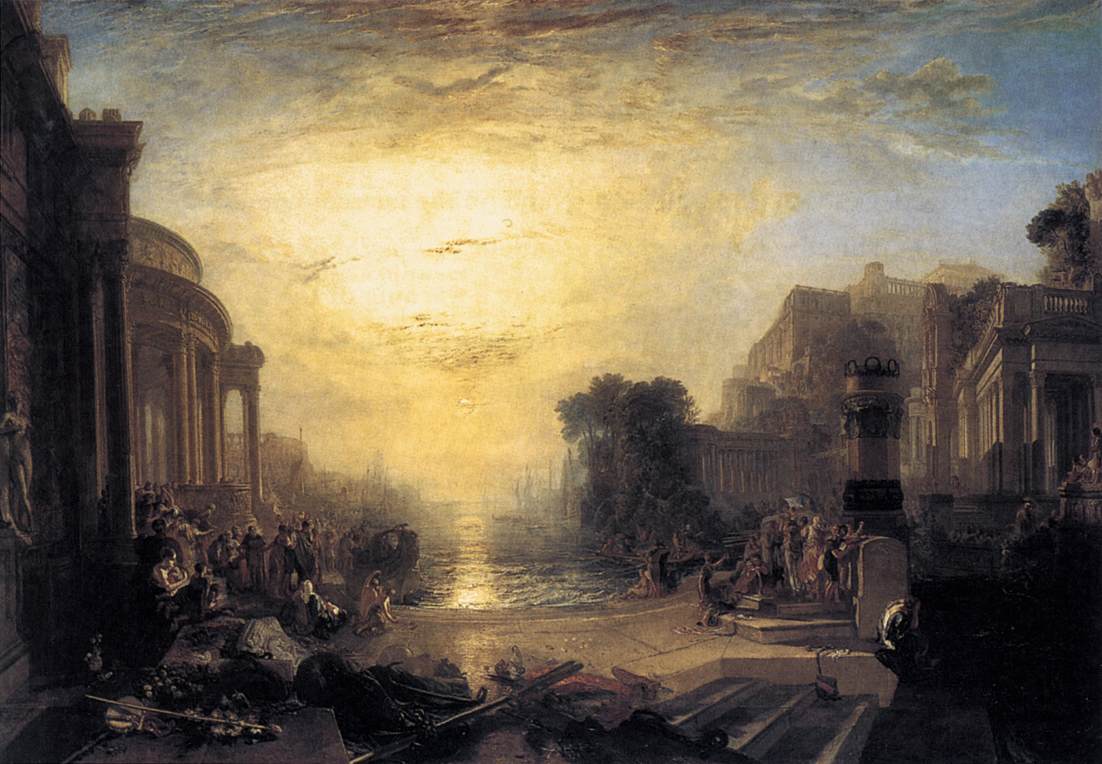Hannibal was born into a prestigious Carthaginian family in 247 BC, as the First Punic War (264–241 BC) was drawing to a close. In the waning years of that war, Hannibal's father, Hamilcar, had waged a brilliant guerilla campaign in Sicily and conducted daring raids against the Italian coast, earning the nickname "Barca" or "Thunderbolt," a name that was adopted by his descendants. After Carthage's calamitous defeat in that war, Hamilcar helped suppress a dangerous rebellion by Carthage's mercenaries and subject allies in North Africa (240–238 BC). After Hamilcar had rescued the Carthaginian state, he forged a new empire for Carthage in the Iberian Peninsula (modern Spain). It was during Hamilcar's campaigns in Hispania that Hannibal would learn the military skills that he would turn against Rome.
About Hannibal's mother, nothing is known. It is possible that she was a foreigner, since Carthaginian noblemen routinely practiced exogamy, or marriage to foreigners. Hannibal's sisters, for example, were married to royalty in Numidia, a region that comprised a substantial portion of Carthage's empire in North Africa. Hannibal had two younger brothers: Hasdrubal and Mago, both of whom served as Hannibal's lieutenants in the Second Punic War. Hamilcar famously declared that his sons were a "brood of lion cubs raised for Rome's destruction"—or so later Romans imagined.1 About Hannibal's childhood we hear only the story of his oath of hatred against Rome, which was recounted by most ancient authors who discuss Hannibal's life in any detail, including Nepos (2.3–4). Shortly before he marched against Italy, he married an Iberian woman. If he had a son, he died young. About Hannibal's physical appearance we are ignorant, apart from a few idealized portraits on contemporary coins.
A clearer picture of Hannibal's character emerges from the many ancient historians who recounted his exploits. The Greek historian Polybius claims that Hannibal had a violent temper.2 An anecdote from the aftermath of his defeat in the Second Punic War suggests that age and experience did little to soften his irritability. When an arrogant politician spoke against the peace treaty, an enraged Hannibal physically assaulted the speaker, dragging him from the podium.3 Hannibal later returned to the senate and apologized for his conduct, citing his unfamiliarity with the customs of politics after a lifetime spent in military service. The Roman historian Livy reports that he combined "the most reckless daring for undertaking risk" (plurimum audaciae ad pericula capessenda) with "the most judicious calm when in danger" (plurimum consilii inter ipsa pericula) and was "more wonderful when facing adversity than in enjoying his success."4
Many ancient authors observe that Hannibal could withstand extreme physical hardships and was moderate in his consumption of food and drink. The harsh realities of his life, which was spent almost entirely at war or in exile, suggest the truth of this assessment. Nevertheless, we should remember that ancient authors tend to characterize individuals as falling into one of two camps: those who were toughened by physical hardship and deprivation and those who were weakened by soft living and indulgence in luxury. These historians, therefore, perhaps tell us more about how Hannibal was thought to behave than about the man he actually was.
Most Roman sources, on which we are largely dependent, dwell on Hannibal's savagery and wickedness. According to Livy, he possessed an "inhuman cruelty, treachery worse than usual for a Carthaginian, disregard for truth and the sacred, a lack of fear towards the gods and respect for oaths and any religion."5 Seneca the Younger offers the grim vision of a depraved Hannibal gazing at a trench filled with blood and declaring "what a beautiful sight!" (o formosum spectaculum).6 Like most of the testimonials preserved by hostile Roman witnesses, such anecdotes should be viewed with skepticism. At the same time, we must remember that Hannibal did engage in a vicious war in Italy for over a decade. The accounts of the atrocities that he committed while attempting to break the will of the Romans and their allies cannot be dismissed simply as the product of Roman bias. There was doubtless good reason why "Hannibal at the gates" (Hannibal ad portas) became shorthand for a looming crisis and an admonition used to frighten Roman children into behaving. It should be noted that Nepos omits any mention of such lurid tales, crafting, all in all, the most favorable portrait of Hannibal offered by any ancient author.
The exploits of Hannibal's life reveal a man of remarkable competence and rare abilities. He inspired breathtaking loyalty and extraordinary obedience among his troops, which included Carthaginians as well as mercenaries recruited from throughout the ancient Mediterranean. Sources recount how he slept on a military cloak, eating the food of the common soldiers and sharing their hardships. As a tactician, his genius was of the first rank. Military leaders to this day study Hannibal's victories at the battles of Trebia, Trasimene, and above all Cannae. In peacetime, he proved himself a dynamic and principled, if not always tactful, politician. Imagine the fortitude it must have taken to return to Carthage after losing a war undertaken at his initiative. Carthaginians, it should be remembered, were in the habit of crucifying defeated generals.
Hannibal not only survived—in no small part because he retained the loyalty of the army—but within a few years he was elected to the highest office in Carthage. As Carthage strained under the terms of its humiliating treaty with Rome, Hannibal worked to prevent the entrenched aristocracy from exploiting the suffering people of the city. He proved himself so successful at reorganizing Carthaginian finances that he offered to pay off early the full total of the war reparations owed to Rome. When Rome spurned the offer, Hannibal's enemies in Carthage engineered his downfall, forcing him to flee the city. In later times, his cunning determination in resisting Roman expansion made him a symbol of the downtrodden and the underdog. It is no coincidence that Hannibal was adopted as an ancestor of the Irish, who imagined themselves in the role of Carthage against the imperial might of the British Empire.
Evaluating Hannibal
The life of Hannibal grants many opportunities to wonder what might have been: what if Hannibal had reached Italy earlier in the season and thus had not lost so many troops and elephants in crossing the Alps; what if Hasdrubal had succeeded in reinforcing Hannibal from Spain; what if reinforcements had come sooner from Carthage...? And yet, one can also look at Hannibal's life as a series of fleeting tactical successes punctuating a record of strategic failures. He inherited a wealthy and expanding empire only to leave Carthage prostrate and at Rome's mercy. He failed to leverage his smashing victory at Cannae to better strategic advantage. He never devised a strategy to combat the Fabian tactics of harassment and disengagement. For all his military daring, he was unable to break Rome's hold over Italy, and misjudged the loyalty of Rome's most important allies. His diplomatic efforts failed to entice another powerful state to attack Rome in Italy. His fugitive latter days, when he fled from the court of one eastern potentate to another, bear the mark of a man obsessed with fighting a war that he had lost years before. In the memorable words of Plutarch, he was now "a tame and harmless bird that had grown too old to fly and had lost its tail feathers."7 Indeed what seemed his only enduring success—the reinvention of Carthage as a vibrant commercial power—would eventually stoke Roman fear of renewed Carthaginian power and greed for the fruits of its enemy's newfound prosperity. In 146 BC, less than forty years after Hannibal's death, Carthage would be razed to the ground by Scipio Aemilianus, the son of Hannibal's great nemesis, Scipio Africanus. Hannibal had achieved immortality—but at a terrible cost. This melancholy tension is perhaps best captured by this short poem by Robert Frost:
Was there even a cause too lost,
Ever a cause that was lost too long,
Or that showed with the lapse of time too vain
For the generous tears of youth and song?
— "Hannibal" (1928)
|
1. Valerius Maximus, 9.3 ext.2. 2. Polybius, 3.15.9. 3. Livy, 30.37. 4. Livy, 21.4.5, 28.12.3. |
5. Livy, 21.4. 6. Seneca the Younger, On Anger 2.5.4. 7. Plutarch, Life of Flamininus 21. |

